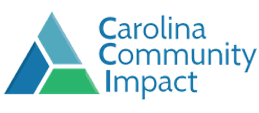“Usually, when people think chiropractor, they think of the viral videos where someone’s getting twisted and popped. I don’t do that,” says Dr. Kayla Hill. “A lot of people come in with headaches, migraines, TMJ, the typical chiropractic stuff, neck pain, and back pain. There are also people who are looking for relief from things like fibromyalgia, or a lot of people will have like psoriatic arthritis. What I do doesn’t cure it, but because we’re moving bones off of the brainstem and off the central nervous system, it allows their body to function a little bit better.”
Dr. Kayla Hill is an upper cervical doctor and the owner of Garner Health Upper Cervical Chiropractic in Garner, NC. She is also a Carolina Community Impact small business borrower who raised $3,000 on CCI’s Kiva lending platform. Her practice has been open for three months, and despite her thoughts that it may take some time for her business to kick off, she’s already planning for growth. “I thought I would be able to handle it [running a business] all on my own, but it took off a lot quicker than I thought it would and I’m gonna have to hire help probably before the end of the year.”
While Garner Health Upper Chiropractic may be a new business, Dr. Hill has been studying and practicing chiropractic for a while. “Before [my business], I was practicing for a little over three years with an office and a city about 30 minutes away.” In addition to her professional experience, she notes that her best learning experience comes from her personal chiropractic journey. “I am my own personal chiropractic case and story. I did not respond well to manual chiropractic care, where they were actually using their hands to move bones. I have some birth defects in my low back. And it just was not for me. I didn’t realize that there were other types of chiropractic until I actually went to chiropractic school,” she explains.
Her professional and personal experience led her to want to start her own business. She began to prepare herself financially, to support her ambition. “Before I did this, I worked with [her former employer] for over three years. So I was just earning income over there,” she explains. “I brought in a certain amount of money each month. I didn’t have a ton set aside slowly over the years gathered little things I wanted to have in my office, but I didn’t really have much capital at all.”
Even after the support and help from her family, who built furniture and chipped in with supplies, Dr. Hill knew that she would need a bit more financial support to keep things afloat while she grew her business. After establishing a relationship with a business mentor/investor, who introduced her to CCI’s Capital Asset Manager, Frank Del Villar, Dr. Hill learned about the Kiva lending platform.
“I read up on [Kiva] before I actually signed up for it. I almost felt undeserving. Like a lot of stories on Kiva are… just different. There are people from all over the world who are starting from actually nothing. I was given things for sure, but I still needed just a little bit extra,” Dr. Hill explains. “ I couldn’t pull it from my paycheck from my last job. I just need it, especially after the pandemic and living in a city where no [relief] money is left. So I figured, I need to do this before I go to the bank.”
Dr. Hill completed her Kiva lending campaign within a few days, raising $3,000. Now, she’s planning for her much-needed expansion. “Now that I’ve raised the money, and I have grown a little bit quicker than I thought I was going to, I’m actually moving out of this office.” She’ll be relocating her practice from a 200 square foot space to one that’s 1200 square feet and will include a waiting room and kids’ play area for her patients. Most importantly, she’s planning to incorporate additional therapies into her practice to expand her clientele.
When Dr. Hill started her business in May 2022, she certainly didn’t think that she’d be talking about expansion so soon. However, her dedication and the help of the Kiva lending platform quickly brought a growth mindset to the forefront of the practice. Her advice to others starting a business and considering outside capital is, “Don’t underestimate yourself. If you’re going to do it, do it. You need to do it wholeheartedly, full force. In the beginning, I definitely felt undeserving and felt like I was less than others, and by doing that, I also inhibited myself and my patients. Business owners should not underestimate or inhibit themselves.”



